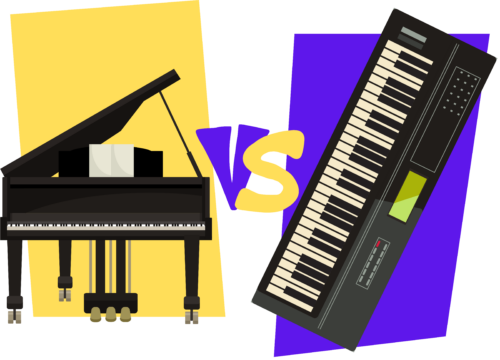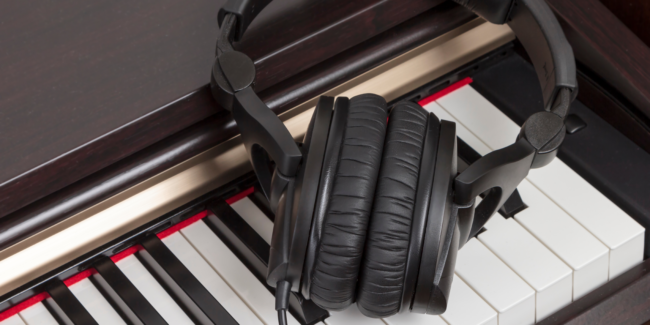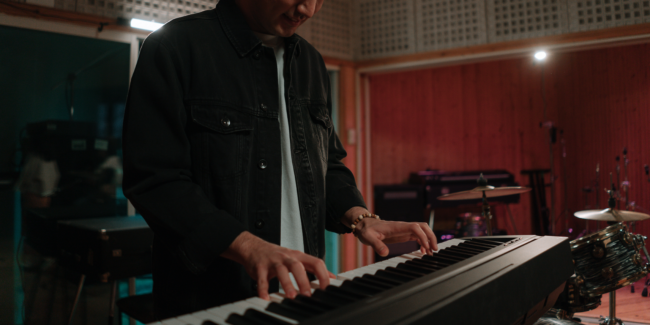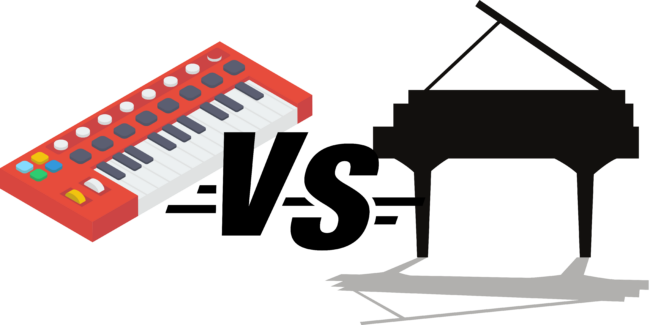The Differences Between a Digital Piano and a Keyboard – Learn to Play an Instrument with step-by-step lessons | Simply Blog

What’s the difference between a keyboard and digital piano? If you’re asking yourself that question, you’re heading in the right direction!
As you choose your instrument, the choices can be a bit overwhelming.
Let’s say you’ve narrowed it down to a piano, but you don’t necessarily want your new pastime to take over your living space.
In that case, you can choose between a digital piano or a keyboard. These lighter-weight options will tuck into a corner more easily than a baby grand or an upright.
So what is the difference between a digital piano and a keyboard? And, which one is the best choice for you?
Let’s put both of these players in the ring, and you can see which comes out the winner.
Mục Lục
What’s a digital piano?
An acoustic piano is technically a stringed instrument with tiny hammers inside that play the keys.
On the other hand, a digital piano merely tries to capture the sound and touch of an acoustic piano.
But instead of hammers that hit strings, most digital pianos use synthesized sounds or layered recordings from an acoustic piano. Some digital pianos are even set in consoles to keep the elegant look of an acoustic piano.

What are the benefits of buying a digital piano?
A digital piano can be doubly beneficial if you use Simply Piano to learn how to play the piano.
Here’s why!
- Weighted keys and pedals – Most digital pianos have weighted, standard-size keys that copy the key action of an acoustic piano. This allows you to transfer your skills easily to an acoustic piano. Digital pianos often have one to three pedals: soft pedal, sostenuto pedal, and damper pedal. These pedals allow you to create satisfying sounds similar to an acoustic piano.
- Low-maintenance – The parts on a digital piano don’t deteriorate as quickly as the wood, felt, and strings of an acoustic piano. You don’t have to service it regularly either. Keep food and drinks away from the keys and clean them with a handheld vacuum with minimal suction. Don’t use canned air as this can damage sensitive electrical components.
- Recording options – Most digital pianos allow you to record and save your practice sessions. This option can be invaluable as you teach yourself to play the piano. After a few weeks of practicing, you can record some of your first songs and see how far you progress.
- More for the money – You can get a better sound for your money with a mid-range digital piano. A higher-quality digital piano will have a better sound than a low-quality acoustic piano and may be comparably priced. With proper care, many high-end digital keyboards can hold up for 20 to 50 years.
What’s a keyboard?
Keyboards are smaller-scale, portable instruments that often come with 61, 66, or 78 keys instead of 88. The keys will usually be semi-weighted or unweighted.
Electric keyboards contain sound samples of hundreds of different instruments. When you press the keys, the keyboard replays these sample sounds. Keyboards range from children’s toys to high-end instruments that producers and musicians use to create soundtracks.

What are the benefits of buying a keyboard?
A keyboard will have a different feel than an acoustic piano or a digital piano, but it has some advantages that are all its own.
- Sound options – Keyboards can contain hundreds of different sounds to try out. Don’t want to learn to play the harp, violin, or tuba? Just press a button on your keyboard to transform the sound of your instrument. We’ll still give you three stars in the Simply Piano app for your personalized rendition.
- Low-maintenance – You to tune acoustic pianos once or twice a year, and after each move to preserve their sound quality. Since keyboards don’t have strings, they don’t require regular maintenance. You can also carry an electric keyboard around wherever you want and never worry about it going out of tune.
- Portable – After you build your skills with the help of tutorials, an electric keyboard will let you take your show on the road. You can take it with you to play at coffee shops, events, and even at your best friend’s wedding. Not many musicians go busking with an acoustic piano, that’s for sure!
- Least expensive option – An electric keyboard can be the least expensive route to playing the piano. You can find a decent keyboard for around $100.

Digital piano vs. keyboard.
We’ve covered some of the basics of these two instruments. So which one is better for beginners – digital pianos or keyboards? Let’s see how they compete side-by-side.
Portability.
The most portable digital pianos are slabs. These can still be a bit bulky to carry around, though. Most slabs come with 88 standard-size keys and are usually between 50 and 57 inches long. These can range from 20 to 100 pounds. Some high-performance digital pianos can weigh even as much as 300 pounds. You probably won’t be taking that one to a recital any time soon!
A keyboard may be a better option if you are looking for a portable piano to carry with you to practice or play. You can find keyboards with only 37 keys if you really want a travel-sized instrument.
If you are looking for a bit more range, you can go with a keyboard piano with 49, 54, 61, or the full 88 keys. Unlike digital pianos, keyboards generally don’t have weighted keys or lighter parts. Many keyboards will weigh around 20 pounds, and some are even lighter.
Sound quality.
A digital piano layers sound to create high-quality music that imitates the sounds of an acoustic piano. Some digital pianos even have hammers.
However, keyboards can store hundreds of sounds if you are looking for various sounds. A digital piano will usually only offer ten to twenty options.
Touch quality.
Digital pianos usually have weighted, standard width keys like acoustic piano keys. This feature is excellent if you want to build up your finger strength at home to play on an acoustic piano at recitals or events. It will be easier to transfer your skills from a digital piano to an acoustic piano than from a keyboard to an acoustic piano.
However, many young children are still learning muscle control, and heavy keys can be more challenging to play. For a young child, the easy touch of a keyboard can make the music flow easier from their fingers.
Digital piano or keyboard? The best choice for a beginner.
So, now for the final answer. Is a digital piano or keyboard best for a beginner?
Drumroll…
A digital piano is best for beginners who want a sound that closely resembles an acoustic piano. You can get a high-quality digital piano which can be easier on the budget than an acoustic piano. It will also require little to no maintenance.
However, a keyboard will be best for students who want a portable instrument and a broader range of sound options. If you’re going to layer sounds for a soundtrack, a keyboard can be an all-in-one instrument.
Once you’ve decided on the instrument that fits your needs, we are ready to help you start your dream of playing piano.
FAQs.
Is it OK to learn piano on a keyboard?
Yes, you can learn piano skills on a keyboard. Many serious musicians and music producers even use keyboards for their different sound effects and recording capabilities. You can find small-scale keyboards for beginners with 61, 66, or 72 keys. Or, you can choose a keyboard with 88 keys like an acoustic piano.
Do you need 88 keys to learn piano?
While it’s great to have 88 keys when learning to play the piano, it is unnecessary. Smaller-sized keyboards can be easier to pack up and less intimidating to play. Most pop songs you hear on the radio won’t use more than five octaves on a piano. That’s just 61 keys!
Do digital pianos need servicing?
You don’t need regular maintenance for a digital piano like an acoustic piano. However, if you begin to notice that your keyboard has hammer action noise or the sound is not working properly, you should have it serviced.
To prevent issues, keep your electric piano away from windows and doors. Also, it is a good idea to cover your keyboard with a dust cover when not in use.















![Toni Kroos là ai? [ sự thật về tiểu sử đầy đủ Toni Kroos ]](https://evbn.org/wp-content/uploads/New-Project-6635-1671934592.jpg)


